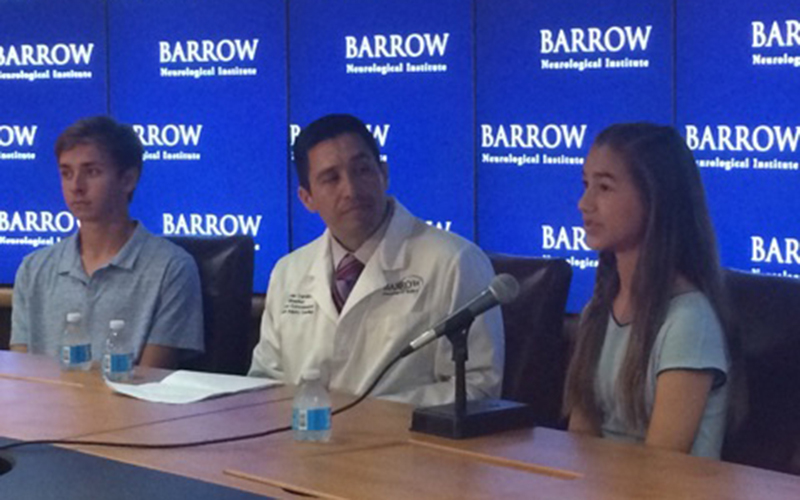
Dr. Javier Cardenas, Andrew Wachtel and Bianca Feix address the media at the Barrow Neurological institute. (Photo by Kristina Vicario/Cronkite News)
PHOENIX – At first blush, the statement from Dr. Javier Cardenas might have troubled some parents of young athletes.
“I’m happy to tell you that more athletes are reporting concussions,” said Cardenas, a sports neurologist at the Barrow Concussion and Brain Injury Center.
What could possibly be good about an increase in athletes who reported concussions?
It could be a sign that athletes and coaches are getting smarter when it comes to head trauma.
While concussions are still a concern for student-athletes, there is evidence that efforts to educate teens about brain injuries is raising concussion awareness and reporting, according to a survey of more than Arizona 300 high school students, athletes and non-athletes both.
Cardenas, who was joined by student-athletes Andrew Wachtel and Bianca Feix, announced the results of the survey during a press conference Friday at St. Joseph’s Hospital and Medical Center in Phoenix.
In the survey, 75 percent of respondents said they have received concussion education and 79 percent of respondents would immediately tell their coach if they suspected they suffered a concussion.
Cardenas attributed the rise in concussion awareness to the Barrow Brainbook, a web-based learning tool developed specifically for high school athletes to educate them about signs and causes of brain injuries.
“The message to coaches is that your athletes trust you,” he said. “We want to ensure that our coaches are the ones who are well-educated about this program.”
Cardenas launched the Barrow Brainbook in 2011 and he said more than 300,000 Arizona high school athletes have completed the concussion education program since then. It is currently mandated for all AIA student-athletes, and is also used by school districts in the San Francisco area and by Arizona State athletics.
According to the survey, almost one in three Arizona high school senior athletes reported suffering a concussion at some point during their high school career. One in four boys decided not to play high school football because of concussion concerns. One in 10 girls decided not to play high school soccer because of concussion concerns.
Wachtel, a Chaparral High School freshman, is currently sitting out from football after he sustained a concussion during practice. He said it happened during a blocking drill, when he was involved in a head-to-head collision with a teammate.
“I started feeling nauseous and had problems with my vision,” he said. “I couldn’t think clearly.”
Eighth grader Bianca Feix suffered a concussion while playing volleyball for Sts. Simon and Jude Catholic School in Phoenix in August 2015. Bianca said she suffered the injury when she was hit in the head with the ball, but at the time she did not think too about it, since it had happened before.
She didn’t begin experiencing symptoms until later when she was at home.
“Headaches, nausea, sensitivity to light,” Bianca said, ticking off the symptoms. “Then I went to the (emergency room) and found out I had a concussion.”
It took Bianca three months to recover from the concussion and get back to playing sports.
But, there is still more work to be done. Only 30 percent of students said they would tell their parents about a concussion. And 42 percent of athletes who have had a concussion say they are not afraid of the long-term impact of suffering one or multiple concussions.
Of the teens surveyed, 61 percent said they are more aware of the symptoms and dangers of concussions than they were a few years ago. And 89 percent of teens say they would report it if a teammate or friend has had a concussion playing a school sport.
Cardenas believes the rise in concussion education also has lowered the threshold for what is diagnosed as a concussion. Historically, it was believed that a concussion was only sustained if the athlete lost consciousness, when actually less than 10 percent of all concussions occur from hits that lead to knockouts.
“Ninety-percent of concussions occur without a loss of consciousness.” he said.
Cardenas hopes to expand the Brainbook program into other school districts in Arizona and across the nation.
“We will continue our initiatives,” he said. “We will continue our programs to make sure that all of our Arizona athletes can have healthy and safe lives.”